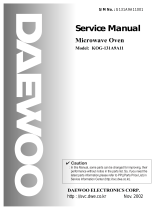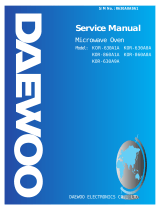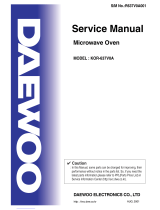
SAFETY AND PRECAUTIONS........................................................................................................... 2
1. FOR SAFE OPERATION .............................................................................................................. 2
2. FOR SAFE SERVICE PROCEDURES ......................................................................................... 2
SPECIFICATIONS............................................................................................................................... 3
EXTERNAL VIEW................................................................................................................................ 4
1. OUTER DIMENSION..................................................................................................................... 4
2. FEATURE DIAGRAM.................................................................................................................... 5
3. CONTROL PANEL........................................................................................................................ 6
INSTALLATION................................................................................................................................... 8
OPERATIONS AND FUNCTIONS....................................................................................................... 9
DISASSEMBLY AND ASSEMBLY...................................................................................................... 10
INTERLOCK MECHANISM AND ADJUSTMENT............................................................................... 17
TROUBLE SHOOTING GUIDE ........................................................................................................... 18
MEASUREMENT AND TEST.............................................................................................................. 22
1. MEASUREMENT OF THE MICROWAVE POWER OUTPUT ...................................................... 22
2. MICROWAVE RADIATION TEST................................................................................................. 23
3. COMPONENT TEST PROCEDURE............................................................................................. 24
WIRING DIAGRAM.............................................................................................................................. 25
PRINTED CIRCUIT BOARD................................................................................................................ 26
1. CIRCUIT CHECK PROCEDURE .................................................................................................. 26
2. PCB CIRCUIT DIAGRAM.............................................................................................................. 29
3. P.C.B. LOCATION NO. ................................................................................................................. 30
EXPLODED VIEW AND PARTS LIST................................................................................................. 31
1. DOOR ASSEMBLY ....................................................................................................................... 31
2. CONTROL PANEL ASSEMBLY.................................................................................................... 31
3. TOTAL ASSEMBLY....................................................................................................................... 31
(a) Do not operate or allow the oven to be operated with the door open.
(b) Make the following safety checks on all ovens to be serviced before activating the magnetron or other microwave
source, and make repairs as necessary: (1) Interlock operation, (2) Proper door closing, (3) Seal and sealing
surfaces (arcing, wear, and other damage), (4) Damage to or loosening of hinges and latches, (5) Evidence of
dropping or abuse.
(c) Before turning on power to the microwave oven for any service test or inspection within the microwave
generating compartments, check the magnetron, wave guide or transmission line, and cavity for proper
alignment, integrity, and connections.
(d) Any defective or misadjusted components in the interlock, monitor, door seal, and microwave generation and
transmission systems shall be repaired, replaced, or adjusted by procedures described in this manual before the
oven is released to the owner.
(e) A microwave leakage check to verify compliance with the Federal performance standard should be performed on
each oven prior to release to the owner.
PRECAUTIONS TO BE OBSERVED BEFORE ANDI
DURING SERVICING TO AVOID POSSIBLE
EXPOSURE TO EXCESSIVE MICROWAVE ENERGY
























